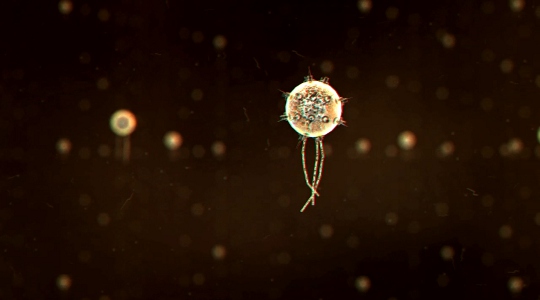Gordon Myers
Articles on Life, Truth, Love, Computers, and Music
A Revolution in Consciousness
I'm a big fan of NBC's hit drama Revolution. (Warning: spoilers ahead.) Admittedly though, I've been less satisfied with the second season so far, but nevertheless have remained a faithful follower of the show. One of the things that I've felt has detracted from the storyline has been the writers' obvious penchant for a purely materialistic view of life, the universe, and everything... which has permeated the story lately.
In the first season, the big reveal was finding out that the source of the show's mysterious blackout was in quadrillions of tiny little robots floating ubiquitously in the air. The second season revelation is that these nanomachines have become intelligent and self-aware. One character points out that the human brain is little more than electrical signals bouncing around in a network, and that this machine was functioning in an identical way. And because of its sheer scope, for all intents and purposes, the machine had become God.
The ideas are cleverly presented, though intellectually rather stale. Nevertheless, they raise some important and fun questions:
- Are you and I electrical signals bouncing around in a network of neurons?
- Is consciousness determined and defined by brain matter? (or robots?)
- Can we expect to find God manifested in some material form?
Recently I discovered a fascinating interview which sheds some light on these questions and more. The folks from the Christian Science Journal had a chance to speak with Dr. Eben Alexander regarding his recent book, Proof of Heaven: A Neurosurgeon's Journey into the Afterlife. The Journal interview does a good job of culling many of the important points, and can be read online at this link.
As Dr. Alexander's subtitle suggests, he was a neurosurgeon -- and a rather prestigous one I gather, as his résumé includes 25 years of practice at well-known hospitals like Harvard Medical School, Brigham & Women's, and more. And for all of his career he was a self-described skeptic with perhaps even more of a dismissively materialistic view of the universe than the NBC writers. That changed after the big event described in his book, and as you can see based off what he has to say now:
"The pure, scientific, materialist model that I worshipped for so many years has absolutely nothing to offer up in terms of explaining how consciousness might emerge from the physical brain. [...] Pure materialism does not explain the nature of existence in reality. [...] It's time for brain science, mind science, physics, cosmology, to move from kindergarten up into first grade and realize we will never truly understand consciousness with that simplistic materialist mindset."
The interview highlights the event that inspired his book. Briefly, he contracted a rare form of meningitis which, over time, totally destroyed his neocortex and left him brain dead. He was in a coma for a week with literally zero brain activity. There was nothing left to have activity! Prior to this, he had written off anyone claiming "near death experiences" as delusional, most likely having hallucinated their "journeys" due to random synapses firing. But in his own experience, he had no brain activity. His neocortex was physically gone. Yet, as he explains, through it all his consciousness continued uninterrupted.
He discovered that life and consciousness is ultimately "all one, and divine at the core." He felt a reassurance telling him, "you are loved; you can't do anything wrong; you have nothing to fear." Jumping in with my own thoughts... I think those three messages echo well what's written in 1 John 4:19, Romans 8:38-39, and Isaiah 41:10, respectively.
It's a fascinating interview in so many ways, and gives us glimpses at the real nature of consciousness and reality. (Read it yourself!) So while I do continue to watch "Revolution" on NBC for the entertainment value, the real "revolution" going on is this realization that matter doesn't determine consciousness; it's the other way around!

1 Comment from the Community:
Well put, Gordon. I find a similar hollow experience when watching shows with a romantic plot line where the two love birds can't be together at first. The writers draw the story out over episodes, or even seasons (!), and it's clear that the two have a deep affection for each other, make sacrifices for each other, LOVE each other. But when the plot turns so they finally can be together, they just rush to hop into bed. Maybe that's the way things work for a lot of people. But even people who don't think much about spirituality tend to recognize the difference between love and lust. It's disappointing when the writers don't give their audiences credit for that!